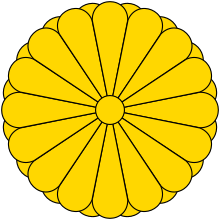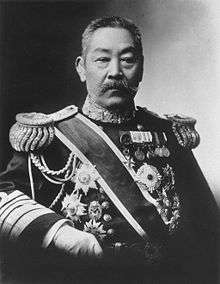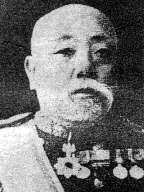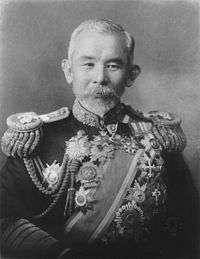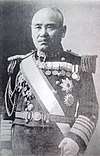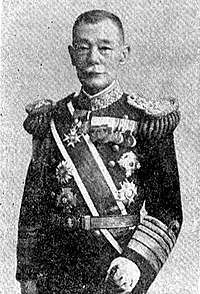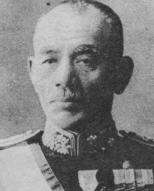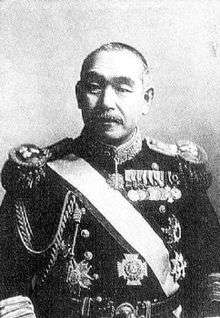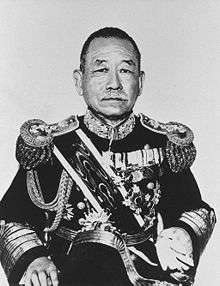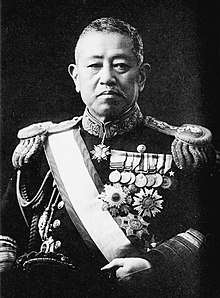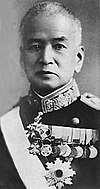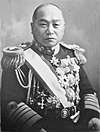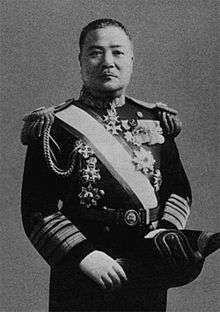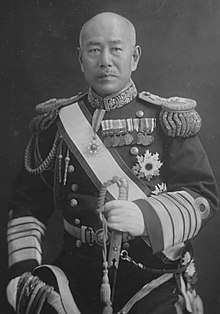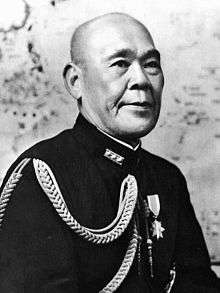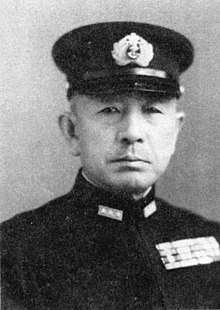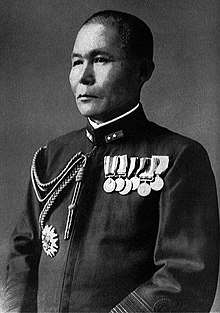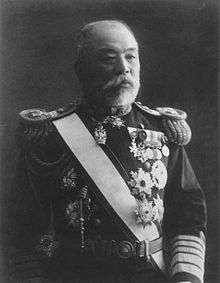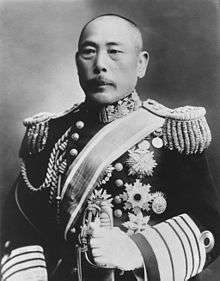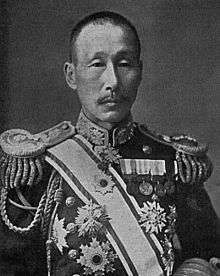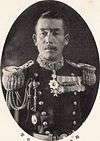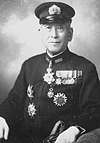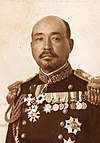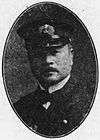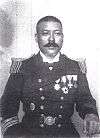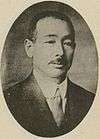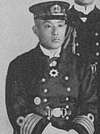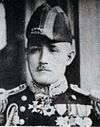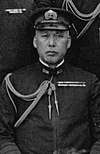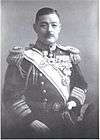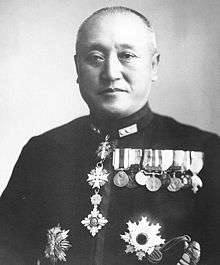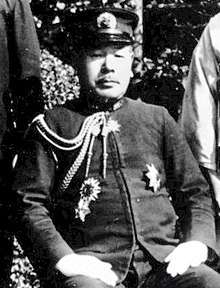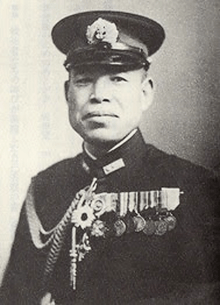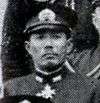Combined Fleet
Combined Fleet (聯合艦隊, Rengō Kantai) was the main sea-going component of the Imperial Japanese Navy. Until 1933, Combined Fleet was not a permanent organization, but a temporary force formed for the duration of a conflict or major naval maneuvers from various units normally under separate commands in peacetime.
- For the "Carrier Striking Task Force", see Kidō Butai.
| 聯合艦隊 Rengo Kantai Combined Fleet (Imperial Japanese Navy) | |
|---|---|
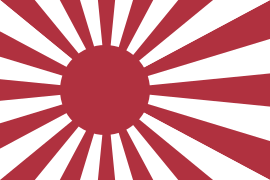 | |
| Active | 1894–1945 |
| Country | |
| Allegiance | |
| Branch | |
| Type | Sea-going component of the Imperial Japanese Navy |
| Engagements | First Sino-Japanese War Russo-Japanese War World War I Second Sino-Japanese War World War II |
| Commanders | |
| Notable commanders | Tōgō Heihachirō Isoroku Yamamoto |
| Insignia | |
| Identification symbol | |
History
Sino-Japanese War (1894–95)
Combined Fleet was formally created for the first time on 18 July 1894 by the merger of the Standing Fleet and the Western Fleet. The Standing Fleet (also known as the Readiness Fleet) contained the navy's most modern and combat-capable warships. The Western Fleet was a reserve force consisting primarily of obsolete ships deemed unsuitable for front-line combat operations, but still suitable for commerce protection and coastal defense. Vice-admiral Itō Sukeyuki was appointed the first Commander-in-Chief of Combined Fleet[1] for the duration of the first Sino-Japanese War against China.
Russo-Japanese War (1904–05)
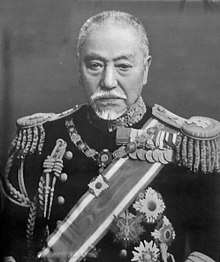
Combined Fleet was re-formed during the Russo-Japanese War of 1904–05 to provide a unified overall command for the three separate fleets in the Imperial Japanese Navy. The IJN 1st Fleet was the main battleship force, which formed the backbone of the navy and was intended to be used in a traditional line-of-battle showdown with an equivalent enemy battleship fleet (kantai kessen). The IJN 2nd Fleet was a fast, mobile strike force with armored cruisers and protected cruisers. The IJN 3rd Fleet was primarily a reserve fleet of obsolete vessels considered too weak for front-line combat service, but which could still be used in the operation to blockade Port Arthur. Admiral Tōgō Heihachirō was commander-in-chief of Combined Fleet during the Russo-Japanese War.
Interwar years
Combined Fleet was not maintained as a permanent organization, but was temporarily created when necessary during fleet maneuvers or when called for by extraordinary circumstances. Thus, during the period from 1905–1924, Combined Fleet was created only sporadically as the occasion or circumstances dictated, and disbanded immediately afterwards.
In 1924, the Imperial Japanese Navy declared in an edict on fleet organization that "for the time being" Combined Fleet would be a standing organization consisting of the IJN 1st Fleet and IJN 2nd Fleet. As this was not intended to be "permanent" and since the commander of IJN 1st Fleet concurrently directed Combined Fleet, Combined Fleet was not given a Headquarters staff of its own.
From 1933, with the Manchurian Incident and the increasing tension with China, a permanent HQ staff for Combined Fleet was established. By the late 1930s, it included most of Japan's warships—only the base units, the Special Naval Landing Forces, and the China Area Fleet lay outside Combined Fleet.
World War II

Combined Fleet came under direct command of the Imperial General Headquarters in 1937. With the start of the Pacific War with the attack on Pearl Harbor carried out by Combined Fleet's Kido Butai (1st Air Fleet), Combined Fleet became almost synonymous with the Imperial Japanese Navy. It comprised the battleships, aircraft carriers, aircraft, and the components that made up the main fighting strength of the IJN. It was first mobilized on the whole for the Battle of Midway. After the devastating carrier losses at Midway and in the Solomon Islands campaign, the navy re-organized into a number of "Area Fleets" for local operational control of various geographic zones. Combined Fleet then evolved into more of an administrative organization.
As the war situation deteriorated for the Japanese and the territories controlled by the "Area Fleets" fell one after another to the United States Navy, the Imperial General Headquarters and the Imperial Japanese Navy General Staff acted to force the American fleet into a "decisive battle" in the Philippines per the kantai kessen philosophy. In the resultant Battle of the Philippine Sea and the Battle of Leyte Gulf the Japanese fleet was severely depleted. The remnants of Combined Fleet fled to Okinawa, but further operations were hindered by lack of fuel and air cover. By the time of the final suicide mission of the battleship Yamato in Operation Ten-Go, Combined Fleet had ceased to exist as an effective combat force.
Commander-in-Chief (司令長官, Shireichōkan)
| No. | Portrait | Commander-in-Chief | Took office | Left office | Time in office |
|---|---|---|---|---|---|
| 1 | Vice Admiral Itō Sukeyuki 伊藤雋吉 (1843–1914) | 18 July 1894 | 11 May 1895 | 297 days | |
| 2 | Vice Admiral Arichi Shinanojō[lower-alpha 2] 有地品之允 (1843–1919) | 11 May 1895 | 16 November 1895[lower-alpha 3] | 189 days | |
| 3 | Vice Admiral (when appointed) Admiral (from 6 June 1904) Tōgō Heihachirō 東郷平八郎 (1848–1934) | 28 December 1903 | 20 December 1905[lower-alpha 4] | 1 year, 357 days | |
| 4 | Vice Admiral Baron Ijūin Gorō 伊集院五郎 (1852–1921) | 8 October 1908 | 20 November 1908 | 43 days | |
| 5 | Vice Admiral Yoshimatsu Shigetarō 吉松茂太郎 (1859–1935) | 1 November 1915 | 13 December 1915 | 42 days | |
| (5) | Vice Admiral Yoshimatsu Shigetarō 吉松茂太郎 (1859–1935) | 1 September 1916 | 14 October 1916 | 43 days | |
| (5) | Admiral Yoshimatsu Shigetarō 吉松茂太郎 (1859–1935) | 1 October 1917 | 22 October 1917 | 21 days | |
| 6 | Admiral Yamashita Gentarō 山下源太郎 (1863–1931) | 1 September 1918 | 15 October 1918 | 44 days | |
| (6) | Admiral Yamashita Gentarō 山下源太郎 (1863–1931) | 1 June 1919 | 28 October 1919 | 149 days | |
| 7 | Admiral Yamaya Tanin 山屋他人 (1866–1940) | 1 May 1920 | 24 August 1920 | 115 days | |
| 8 | Admiral Tochinai Sojirō 栃内曽次郎 (1866–1932) | 24 August 1920 | 31 October 1920 | 68 days | |
| (8) | Admiral Tochinai Sojirō 栃内曽次郎 (1866–1932) | 1 May 1921 | 31 October 1921 | 183 days | |
| 9 | Vice Admiral (when appointed) Admiral (from 3 August 1923) Takeshita Isamu 竹下勇 (1870–1949) | 1 December 1922[lower-alpha 5] | 27 January 1924 | 1 year, 57 days | |
| 10 | Admiral Suzuki Kantarō 鈴木貫太郎 (1868–1948) | 27 January 1924 | 1 December 1924 | 309 days | |
| 11 | Admiral Okada Keisuke 岡田啓介 (1868–1952) | 1 December 1924 | 10 December 1926 | 2 years, 9 days | |
| 12 | Vice Admiral (when appointed) Admiral (from 1 April 1927) Katō Hiroharu 加藤寛治 (1870–1939) | 10 December 1926 | 10 December 1928 | 2 years, 0 days | |
| 13 | Admiral Taniguchi Naomi 谷口尚真 (1870–1941) | 10 December 1928 | 11 November 1929 | 336 days | |
| 14 | Vice Admiral (when appointed) Admiral (from 1 March 1931) Yamamoto Eisuke 山本英輔 (1876–1962) | 11 November 1929 | 1 December 1931 | 2 years, 20 days | |
| 15 | Vice Admiral (when appointed) Admiral (from 1 April 1933) Kobayashi Seizō 小林躋造 (1877–1962) | 1 December 1931 | 15 November 1933 | 1 year, 349 days | |
| 16 | Vice Admiral (when appointed) Admiral (from 30 March 1934) Suetsugu Nobumasa 末次信正 (1880–1944) | 15 November 1933 | 15 November 1934 | 1 year, 0 days | |
| 17 | Vice Admiral (when appointed) Admiral (from 1 April 1936) Takahashi Sankichi 高橋三吉 (1882–1966) | 15 November 1934 | 1 December 1936 | 2 years, 16 days | |
| 18 | Vice Admiral Yonai Mitsumasa 米内光政 (1880–1948) | 1 December 1936 | 2 February 1937 | 62 days | |
| 19 | Admiral Nagano Osami 永野修身 (1880–1947) | 2 February 1937 | 1 December 1937 | 302 days | |
| 20 | Vice Admiral Yoshida Zengo 吉田善吾 (1885–1966) | 1 December 1937 | 30 August 1939 | 1 year, 272 days | |
| 21 | Vice Admiral (when appointed) Admiral (from 15 November 1940)[lower-alpha 6] Yamamoto Isoroku 山本五十六 (1884–1943) | 30 August 1939 | 18 April 1943[lower-alpha 7][lower-alpha 8] † | 3 years, 231 days | |
| 22 | Admiral[lower-alpha 9] Koga Mine'ichi 古賀峯一 (1885–1944) | 21 May 1943 | 31 March 1944[lower-alpha 10] † | 315 days | |
| 23 | Admiral Toyoda Soemu 豊田副武 (1885–1957) | 3 May 1944 | 29 May 1945 | 1 year, 26 days | |
| 24 | Vice Admiral[lower-alpha 11] Ozawa Jisaburō 小沢治三郎 (1886–1966) | 29 May 1945 | 10 October 1945[lower-alpha 12] | 134 days |
Chief of Staff (参謀長, Sanbōchō)
| No. | Portrait | Chief of Staff | Took office | Left office | Time in office |
|---|---|---|---|---|---|
| 1 | Captain Samejima Kazunori 鮫島員規 (1845–1910) | 19 July 1894 | 17 December 1894 | 151 days | |
| 2 | Captain Dewa Shigetō 出羽重遠 (1856–1930) | 17 December 1894 | 25 July 1895 | 220 days | |
| 3 | Captain Kamimura Hikonojō 上村彦之丞 (1849–1916) | 25 July 1895 | 16 November 1895 | 114 days | |
| 4 | Captain Shimamura Hayao 島村速雄 (1858–1923) | 28 December 1903 | 12 January 1905 | 1 year, 15 days | |
| 5 | Rear Admiral Katō Tomosaburō 加藤友三郎 (1861–1923) | 12 January 1905 | 20 December 1905 | 342 days | |
| 6 | Captain Yamashita Gentarō 山下源太郎 (1863–1931) | 8 October 1908 | 20 November 1908 | 43 days | |
| 7 | Rear Admiral Yamanaka Shibakichi 山中柴吉 (1870–1941) | 1 November 1915 | 13 December 1915 | 42 days | |
| 8 | Vice Admiral Horiuchi Saburō 堀内三郎 (1869–1933) | 1 September 1916 | 14 October 1916 | 43 days | |
| (8) | Vice Admiral Horiuchi Saburō 堀内三郎 (1869–1933) | 1 October 1917 | 22 October 1917 | 21 days | |
| 9 | Rear Admiral Saitō Hanroku 斎藤半六 (1869–1952) | 1 September 1918 | 15 October 1918 | 44 days | |
| 10 | Rear Admiral Funakoshi Kajishirō 舟越楫四郎 (1870–1962) | 1 June 1919 | 28 October 1919 | 149 days | |
| 11 | Rear Admiral Yoshioka Hansaku 吉岡範策 (1869–1930) | 1 May 1920 | 31 October 1920 | 183 days | |
| (11) | Rear Admiral Yoshioka Hansaku 吉岡範策 (1869–1930) | 1 May 1921 | 31 October 1921 | 183 days | |
| 12 | Rear Admiral Shirane Kumazō 白根熊三 (1876–1939) | 1 December 1922 | 1 December 1923 | 1 year, 0 days | |
| 13 | Rear Admiral Kabayama Kanari 樺山可也 (1876–1932) | 1 December 1923 | 10 November 1924 | 345 days | |
| 14 | Captain Hara Kanjirō 原敢二郎 (1880–1948) | 10 November 1924 | 1 December 1925 | 1 year, 21 days | |
| 15 | Rear Admiral Ōminato Naotarō 大湊直太郎 (1879–1958) | 1 December 1925 | 1 November 1926 | 335 days | |
| 16 | Rear Admiral Takahashi Sankichi 高橋三吉 (1882–1966) | 1 November 1926 | 1 December 1927 | 1 year, 30 days | |
| 17 | Rear Admiral Hamano Eijirō 濱野英次郎 (1880–1952) | 1 December 1927 | 10 December 1928 | 1 year, 9 days | |
| 18 | Rear Admiral Terajima Ken 寺島健 (1882–1972) | 10 December 1928 | 30 October 1929 | 324 days | |
| 19 | Rear Admiral Shiozawa Kōichi 塩沢幸一 (1881–1943) | 30 October 1929 | 1 December 1930 | 1 year, 32 days | |
| 20 | Rear Admiral Shimada Shigetarō 嶋田繁太郎 (1883–1976) | 1 December 1930 | 1 December 1931 | 1 year, 0 days | |
| 21 | Rear Admiral Yoshida Zengo 吉田善吾 (1885–1966) | 1 December 1931 | 15 September 1933 | 1 year, 288 days | |
| 22 | Rear Admiral Toyoda Soemu 豊田副武 (1885–1957) | 15 September 1933 | 15 March 1935 | 1 year, 181 days | |
| 23 | Rear Admiral Kondō Nobutake 近藤信竹 (1886–1953) | 15 March 1935 | 15 November 1935 | 245 days | |
| 24 | Rear Admiral Nomura Naokuni 野村直邦 (1885–1973) | 15 November 1935 | 16 November 1936 | 1 year, 1 day | |
| 25 | Rear Admiral Iwashita Yasutarō 岩下保太郎 (1887–1937) | 16 November 1936 | 18 February 1937[lower-alpha 13] | 94 days | |
| 26 | Rear Admiral Ozawa Jisaburō 小沢治三郎 (1886–1966) | 18 February 1937 | 15 November 1937 | 270 days | |
| 27 | Rear Admiral Takahashi Ibō 高橋伊望 (1888–1947) | 15 November 1937 | 5 November 1939 | 1 year, 355 days | |
| 28 | Captain Fukudome Shigeru 福留繁 (1891–1971) | 5 November 1939 | 10 April 1941 | 1 year, 156 days | |
| 29 | Captain Itō Seiichi 伊藤整一 (1890–1945) | 10 April 1941 | 11 August 1941 | 123 days | |
| 30 | Captain Ugaki Matome 宇垣纏 (1890–1945) | 11 August 1941 | 22 May 1943 | 1 year, 284 days | |
| 31 | Vice Admiral Fukudome Shigeru 福留繁 (1891–1971) | 22 May 1943 | 6 April 1944 | 320 days | |
| 32 | Rear Admiral Kusaka Ryūnosuke 草鹿龍之介 (1893–1971) | 6 April 1944 | 24 June 1945 | 1 year, 79 days | |
| 33 | Rear Admiral Yano Shikazō 矢野志加三 (1893–1966) | 24 June 1945 | 25 September 1945 | 93 days |
Footnotes
- Created Baron on 5 June 1896.
- Created Baron on 5 June 1896.
- Forced into retirement on 21 October 1895 for boarding neutral vessels in search of Liu Yongfu, the fugitive president of the Republic of Formosa; Fleet dissolved.
- Fleet dissolved.
- Fleet recreated as permanent entity; given direct command over 1st Fleet.
- Promoted posthumously to Marshal Admiral.
- 1st Fleet separated from direct command on 11 August 1941.
- Killed in action in Operation Vengeance.
- Promoted posthumously to Marshal Admiral.
- Killed in action when Kawanishi H8K ("Emily") flying boat crashed during a typhoon between Palau and Davao.
- Refused promotion to Admiral.
- Fleet surrendered.
- Died of illness.
References
Notes
Books
- D'Albas, Andrieu (1965). Death of a Navy: Japanese Naval Action in World War II. Devin-Adair Pub. ISBN 0-8159-5302-X.
- Dull, Paul S. (1978). A Battle History of the Imperial Japanese Navy, 1941–1945. Naval Institute Press. ISBN 0-87021-097-1.
External links
- Nishida, Hiroshi. "Imperial Japanese Navy". Archived from the original on 30 January 2013. Retrieved 25 August 2007.
- Wendel, Marcus. "Axis Database". Retrieved 25 August 2007.
- World War II Armed Forces – Orders of Battle and Organizations
- Nihon Kaigun
